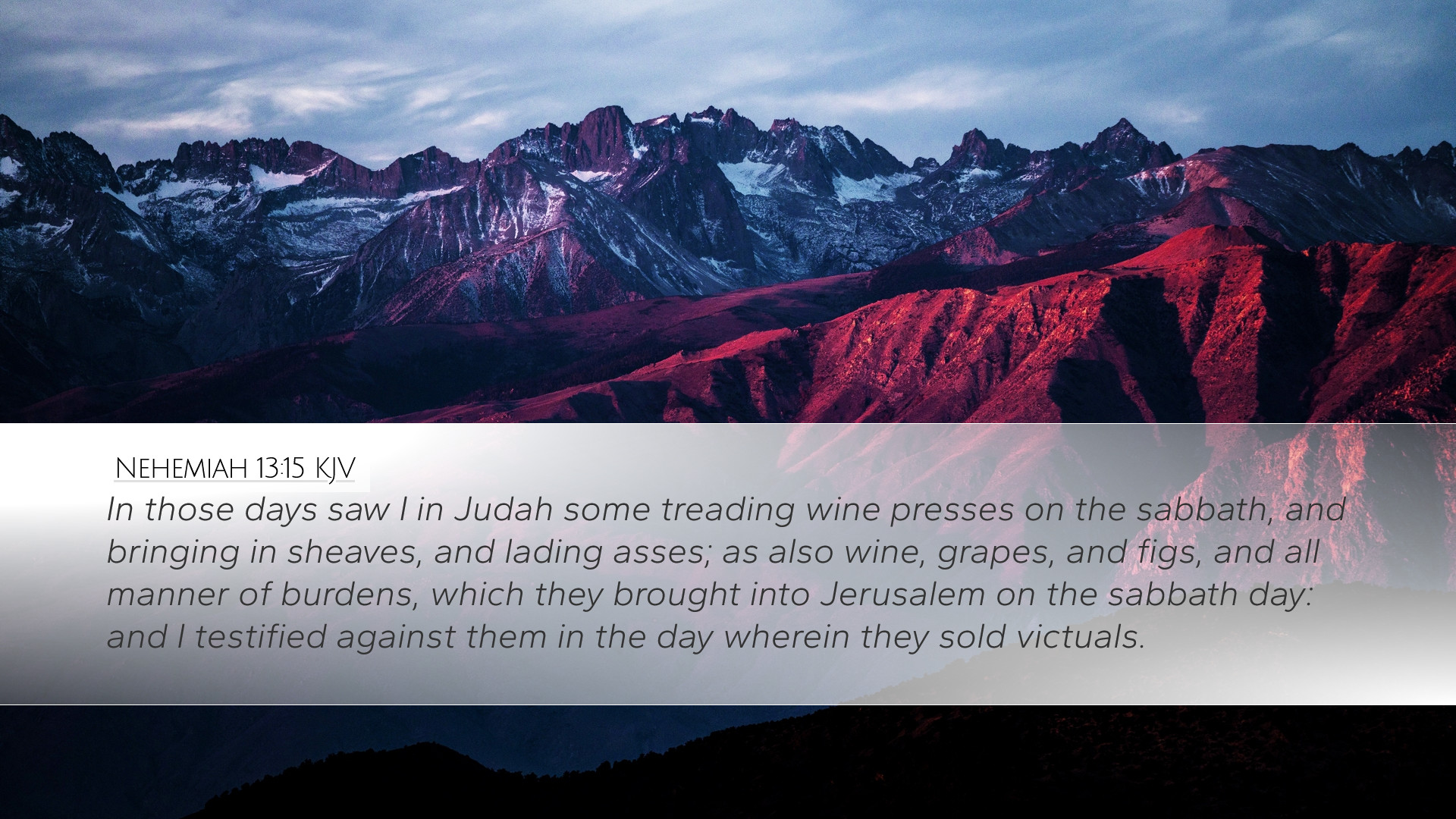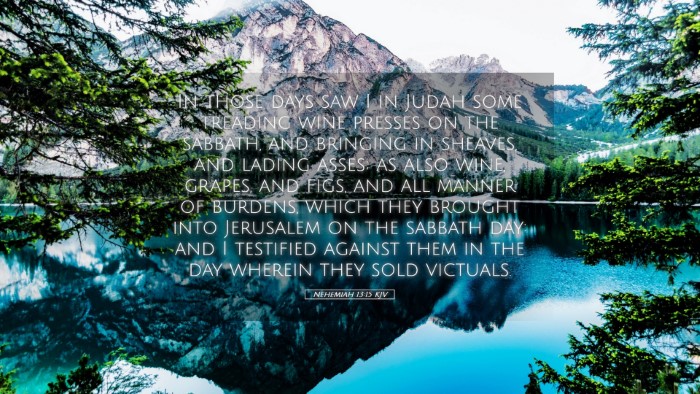Commentary on Nehemiah 13:15
Verse Reference: Nehemiah 13:15 - "In those days I saw in Judah some treading winepresses on the sabbath, and bringing in sheaves, and lading asses; and also wines, grapes, and figs, and all manner of burdens, which they brought into Jerusalem on the sabbath day: and I testified against them in the day wherein they sold victuals."
Introduction
The book of Nehemiah offers a profound insight into the life and governance of the post-exilic community in Jerusalem. Nehemiah himself is a figure of restoration and reform, leading the people in rebuilding both the physical walls of Jerusalem and their spiritual lives.
In Nehemiah 13:15, we encounter a critical moment where Nehemiah contends with the violation of the Sabbath, an essential element of Jewish life and identity.
Contextual Background
After the return from Babylonian captivity, the Jews faced the challenges of re-establishing their identity as God’s chosen people.
The observance of the Sabbath was fundamental not merely as a day of rest, but as a covenantal sign between God and Israel.
In violating the Sabbath, the people were displaying a disregard for God’s commandments, which had profound implications for their relationship with Him.
Insights from Commentators
Matthew Henry
Matthew Henry emphasizes the serious nature of the violation of the Sabbath. He notes that this act was not merely a social inconvenience but a significant trespass against God’s law.
The weekly observance of the Sabbath was intended to be a reminder of God’s creation and rest and a portrayal of dependence on Him for sustenance.
Henry remarks on the zeal of Nehemiah in confronting these issues, relating it to the broader theme of reforming the spiritual life of the nation.
He argues that spiritual leaders must take a stand against sin and admonish the people for straying from divine commandments, even when it is not popular.
Albert Barnes
Albert Barnes provides a more historical and textual analysis of the passage. He highlights the types of labor being conducted on the Sabbath, citing harvest activities and the selling of goods, which were expressly forbidden.
Barnes points out that the actions taken by Nehemiah illustrate a broader neglect of the covenant that the people had previously made to uphold God’s laws.
He emphasizes the importance of separation from the external influences that lead to such compromises.
Barnes notes that Nehemiah’s response—a direct confrontation—was indicative of his commitment to uphold the holiness of the Sabbath and the integrity of the community.
Adam Clarke
Adam Clarke offers a deeper theological insight regarding the Sabbath laws and their significance for the Israelites. He argues that the Sabbath was not just a commandment; it was a means of grace and reflection.
Clarke stresses the danger of treating the Sabbath lightly, noting that neglect of this sacred time can lead to spiritual decay.
He observes how Nehemiah's actions reflect a love for God and a desire to see the community return to true worship.
Clarke also calls attention to the economic motivations behind the violations, suggesting that greed and material concerns often lead individuals away from their spiritual commitments.
Lessons for Today
The message of Nehemiah 13:15 holds profound implications not only for the Jewish community of Nehemiah’s time but also for Christians today.
The significance of the Sabbath as a day of rest and reflection remains a relevant theme. Observing a day set apart for God encourages spiritual rejuvenation and community solidarity.
-
Spiritual Commitment: Just as Nehemiah took a stand for the sanctity of the Sabbath, contemporary leaders and believers are called to uphold the principles of righteousness in their communities.
-
Guarding Against Worldly Influences: The challenges posed by external societal norms can subtly infiltrate the church, necessitating vigilance and discernment.
-
Importance of Reflection: In a fast-paced world, believers must prioritize time for rest, reflection, and communion with God, just as prescribed by the Sabbath rest.
Conclusion
Nehemiah 13:15 serves as a necessary admonition to all who claim to follow God. The diligence of Nehemiah reminds us that faithfulness to God’s commandments requires active engagement and sometimes, confrontation of sin within the community.
By examining the insights provided by Matthew Henry, Albert Barnes, and Adam Clarke, we are encouraged to foster a deeper commitment to the principles of our faith, being mindful of the sanctity of rest, reflection, and the pursuit of holiness in our lives and communities.


